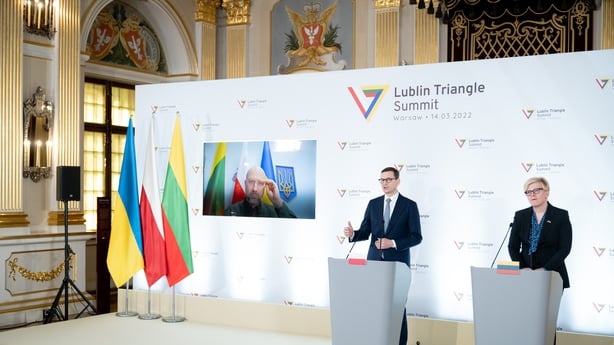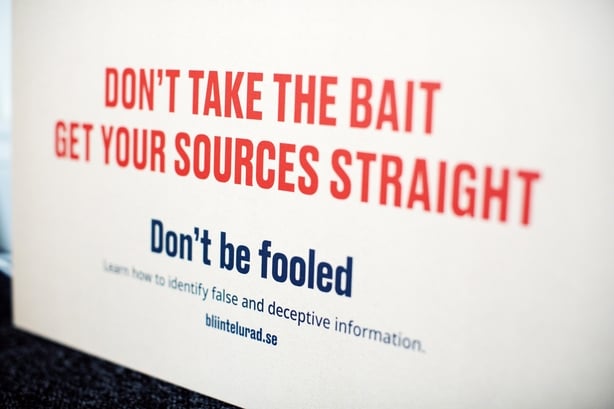The speed at which the information environment is changing, especially with rapid advances in generative AI, is forcing governments globally to reassess their responsibilities when it comes to misinformation and disinformation.
A major new report from the Organisation for Economic Co-operation and Development (OECD) underlines the global nature of the problem, and outlines how specific countries are dealing with it.
It is well researched, the report says, that mis- and disinformation presents a fundamental risk to the "free and fact-based exchange of information underpinning democratic debate."
The study defines misinformation as "false or inaccurate information that is shared unknowingly", while disinformation is "misleading information deliberately created, presented and disseminated to harm a person, social group, organisation or country."
In some countries, government departments have been established to monitor and respond to concerning content. In others, the focus has been on media literacy and education programmes.
International working groups have also been set up to deal with the threat of organised disinformation campaigns from foreign powers.
In a year when roughly half the world's population prepares to vote in elections, that task is more pressing than ever.
Here is how other European countries are tackling disinformation:
Poland, Lithuania, Ukraine

The Lublin Triangle was put in place by Poland, Lithuania, and Ukraine in 2020 to counter perceived Russian disinformation campaigns.
Russia's full-scale invasion of Ukraine in February 2022 opened a new chapter for Russian propaganda targeting countries in the region, in particular Ukraine, which is at the epicentre of Russian disinformation, according to the Polish Ministry of Foreign Affairs.
Lithuania and Poland are supporting Ukraine politically and militarily, are also under constant information attacks from the Kremlin, the ministry said.
To counter Russian disinformation, the three nations identify specific narratives, messages, and tactics used against them; analyse the degree of societal resilience to Russian propaganda; and make recommendations to better address evolving threats.
The work of the Lublin Triangle is guided by a 'Joint Action Plan to Combat Disinformation.'
UK
As part of an aim to fight disinformation, the UK has initiated funding for projects with multiple organisations to enhance media literacy skills among vulnerable groups, who are perhaps more susceptible to misinformation and disinformation.
Through the Media Literacy Taskforce Fund, initiatives target 'hard-to-reach' demographics, aiming to combat false information, including vaccine disinformation and deepfake videos.
Some of the initiatives offer programmes such as podcast development for disadvantaged young people, media literacy training for care workers, and workshops on spotting misinformation for older adults.
Sweden
Sweden established a government agency in January 2022 to fight disinformation threats from foreign governments, including Russia.
The Swedish Psychological Defence Agency analyses and responds to disinformation from foreign influences targeting Swedish interests. The agency also aims to strengthen citizens’ ability to spot and resist disinformation campaigns.
Split into three departments, the agency collaborates with other government bodies to produce reports, develop countermeasures, and enhance Sweden's societal capability to withstand disinformation through critical thinking, education, and coordinated efforts across various sectors.

Finland
Finland's National Media Education Policy, published in 2019 by the Ministry of Education and Culture, promotes the importance of media literacy and enhances critical thinking skills among citizens.
It builds on decades-long efforts to integrate media education into Finnish schools, which began with a curriculum introduced in 2004 to address media violence and promote media literacy.
The policy incorporates concepts around misinformation and disinformation, teaching students about propaganda, advertising, and the use of misleading statistics, and encourages active participation in media creation and analysis.
Italy
In Italy, the Department for Information and Publishing addresses disinformation as one of its primary objectives. The department focuses on ensuring a professional, independent, and diverse information ecosystem while safeguarding the free flow of trustworthy information. It supports media freedom and pluralism through various initiatives, including financial support to professional media to foster information pluralism.
Additionally, the department works on implementing the National Cybersecurity Strategy, which includes strengthening citizens' media literacy and developing in-depth knowledge of disinformation threats.
Government departments, agencies and education campaigns have been employed across Europe to deal with disinformation and to build up public awareness of disinformation.
However, regulating mis- and disinformation continues to be a complex issue due to difficulties in spotting such content and concerns about overreach that may curb free speech.
The report recognises efforts made by the Irish government to try to counter disinformation with the ‘National Counter Disinformation Strategy Working Group’, made up of representatives from industry, academia, civil society and government departments to examine subject areas pertinent to disinformation.
It also highlights to the Media Literacy Ireland campaign called ‘Be Media Smart’, first launched in 2019 as part of a European initiative to counter disinformation in advance of the 2019 European elections, which switched focus in 2020 to provide accurate information about Covid-19, and later vaccination.
The OECD report calls for comprehensive governance approaches that prioritise information integrity by fostering free, diverse, and transparent information ecosystems.
However, it also recognises that online platforms must also be accountable for trying to deal with the spread of disinformation during electoral periods, foreign information manipulation and interference campaigns, and the implications of generative artificial intelligence.
"No single democracy can solve the problem of rising disinformation on its own," OECD Secretary-General Mathias Cormann said on launching the report, "but every democracy can support independent and diverse journalism, encourage accountability and transparency of online platforms, and help build citizens’ media literacy to encourage critical consumption of content, to address the challenge of disinformation and its corrosive effect on trust."







